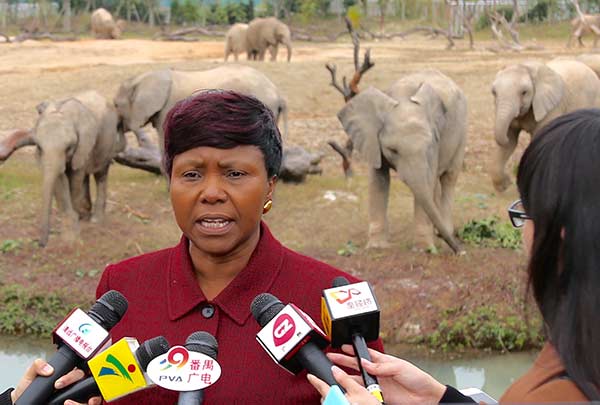Relocation of wild African elephants to China hailed
Updated: 2016-01-06 08:20
By Qiu Quanlin in Qingyuan, Guangdong(China Daily)
|
||||||||
|
Oppah Muchinguri, Zimbabwe's environmental minister, said during a visit to Qingyuan, Guangdong province, that more African elephants will be sent to China for a better life. Qiu Quanlin / China Daily |
Relocating more wild African elephants from Zimbabwe to China in the near future will help protect the animals, as they will be in a better and safer environment, a high-ranking Zimbabwean official said.
"We are happy to see that young African elephants have been well accommodated here in China. They look very healthy and energetic," said Oppah Muchinguri, Zimbabwe's environmental minister, during a visit to a rare plants and animals center in Qingyuan, Guangdong province.
Early last year, 25 young African elephants were imported from Zimbabwe to the center as part of an international African elephant conservation program.
At the center, developed by domestic theme park and tourism operator Chimelong Group, the young elephants eat fruit, cereals and grasses, some of which are imported from the United States.
It includes a 1,300 square-meter food processing house, and a group of veterinarians, according to the center.
Muchinguri said more African elephants and other animals from Zimbabwe will be sent to the center, as the country has been trying to protect them from being poached and threatened by the worsening environment.
"Because of the bad weather, including drought and climate change, we cannot keep the large population of elephants any longer," said Muchinguri.
As a result, Zimbabwe has been looking for international cooperation to protect them.
"Wild animals, elephants in particular, consume lots of water and food, which we cannot afford. Sometimes, they destroy our crops," she said.
Zimbabwe currently has 85,000 African elephants, of which a growing number have been threatened by human activities such as poaching, according to Muchinguri.
"Poaching elephants is becoming serious and sophisticated in Zimbabwe. We will work closer with the Chinese side in anti-poaching," she said.
Muchinguri said the introduction of the animals to China would help Zimbabwe invest more in elephants conservation.
"Our ecosystem cannot handle such a large number of animals. So we would rather export and sell more elephants and other animals to those willing to take care of them," she said.
Early overseas media reports have criticized Zimbabwe's government for selling young elephants to China, saying the move, which had already sparkled outrage from animal rights advocates, would destroy the animals' living environment.
The elephants, all more than 5 years old, were part of a 27-strong group of elephants captured in 2014 in Hwange National Park, according to Muchinguri.
"We will not apologize for selling elephants to China. As you see they are living very healthy lives here. And the introduction of the African elephants will help arouse awareness of the need for better protection of the wild animals," she said.
- Obama says US must act on gun violence, defends new gun control rules
- Over 1 million refugees have fled to Europe by sea in 2015: UN
- Turbulence injures multiple Air Canada passengers, diverts flight
- NASA releases stunning images of our planet from space station
- US-led air strikes kill IS leaders linked to Paris attacks
- DPRK senior party official Kim Yang Gon killed in car accident

 What's in store at CES 2016
What's in store at CES 2016
 Li springs a surprise on coal mine visit
Li springs a surprise on coal mine visit
 Man proposes to his beloved with a $23,010 ghost castle
Man proposes to his beloved with a $23,010 ghost castle
 New Year's wishes from Chinese expatriates
New Year's wishes from Chinese expatriates
 Xi begins new year with visit to Chongqing
Xi begins new year with visit to Chongqing
 Top 10 events that moves the stocks
Top 10 events that moves the stocks
 Top 10 travel spots around Hainan
Top 10 travel spots around Hainan
 Highlights of second stage of Darkar Rally 2016
Highlights of second stage of Darkar Rally 2016
Most Viewed
Editor's Picks

|

|

|

|

|

|
Today's Top News
Shooting rampage at US social services agency leaves 14 dead
Chinese bargain hunters are changing the retail game
Chinese president arrives in Turkey for G20 summit
Islamic State claims responsibility for Paris attacks
Obama, Netanyahu at White House seek to mend US-Israel ties
China, not Canada, is top US trade partner
Tu first Chinese to win Nobel Prize in Medicine
Huntsman says Sino-US relationship needs common goals
US Weekly

|

|









